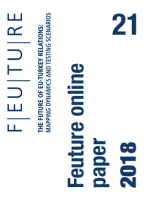Highly Skilled Migration between the EU and Turkey: Drivers and Scenarios

FEUTURE Online Paper No. 21 (2018)
Attracting and retaining highly skilled migrants has become a priority for countries looking to address labour shortages and to strengthen their positions as knowledge-based economies. In this framework the EU and Turkey have, in recent years, been introducing policies aimed at facilitating the arrival of highly skilled migrants. Based on the recognition that migration/mobility is a bi-directional issue, this paper analyses the movement of Turkish highly skilled migrants to the EU and of European highly skilled migrants to Turkey. It focuses on the drivers that affect the mobility of such migrants.
The paper argues that in spite of the lack of cohesive legal frameworks on high-skilled migration between the EU, member states and Turkey, the presence of high-skilled migration frameworks and policies has been a positive driver in EU-Turkey relations. It notes that from 1999 to 2013, political, societal and economic developments in EU and Turkey were drivers that increased the mobility of highly skilled migrants (including students), particularly from the EU to Turkey. The same drivers, in general terms, reversed this trend from roughly 2013 onwards (marked by the Gezi protests in Turkey). In sum, highly skilled migration stands out as an area of mutual benefit, particularly to drive EU-Turkey relations in the direction of “convergence” in 2023.